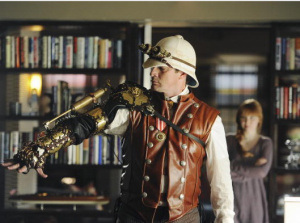Steampunk: Learning the Genre
I found this post today and found it extremely interesting. A number of people have described my Dr Blessing series as falling into the Steampunk genre (I don’t like to call it a subgenre because I prefer its feel to pure Sci-Fi and Fantasy), but I never intended it to be that way, nor did I ever consider it to be the case. I thought: There’s not an airship or pair of brass goggles in sight!
This post, however, shows me that really, I am only picking up on the accoutrements of the genre which developed over time, rather than the original seeds of steampunk. Those seeds including the Victorian notions of the supernatural – which is squarely where another of my novellas, The Seance, exists.
I really am something of a newbie to Steampunk. I erroneously stated in a blog recently that I had last year read my first steampunk book – that isn’t true so I’ll correct it here. A few years ago I read “Glass Books of the Dream Eaters”, its sequel, “The Dark Volume” and have since read some George Mann books: “Ghosts of Manhatten”, “Ghosts of War”, and his first Newbury and Hobbs book, “The Affinity Bridge”. Last year it was “The Immersion Book of Steampunk” a really rather good anthology, I have to say.
Anyway, I wanted to share this post as I found it fascinating and quite enlightening, for me as a real beginner in this fantastic genre.
 Originally posted on No Wasted Ink:
Originally posted on No Wasted Ink:
 A popular subgenre of science fiction and fantasy is known as steampunk. It features steam-powered technology with the decorative sensibilities of the 19th century Victorian era. Steampunk stories can also be considered a sort of alternate history where the British Empire continued on to be a major power in the world and their empirical style of culture and manners still hold sway in a future world.
A popular subgenre of science fiction and fantasy is known as steampunk. It features steam-powered technology with the decorative sensibilities of the 19th century Victorian era. Steampunk stories can also be considered a sort of alternate history where the British Empire continued on to be a major power in the world and their empirical style of culture and manners still hold sway in a future world.
It is often thought that the origin of steampunk as a genre began with H.G. Wells and Jules Verne. The stories of the adventurer explorer or the gentleman inventor who travels through the world or in time via their abilities and education and bring British culture to other peoples is a trope that is common in many steampunk stories. While Wells and Verne were certainly part of the inspiration of steampunk as a genre, they were writing alternate history or true science fiction of…
View original 670 more words





